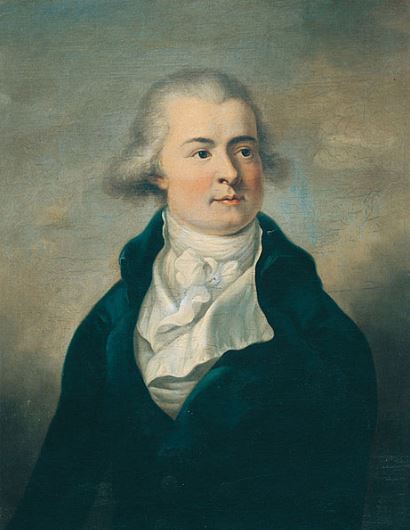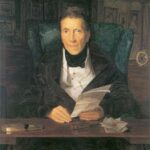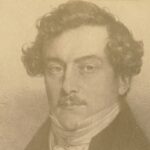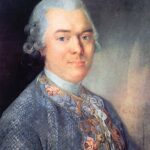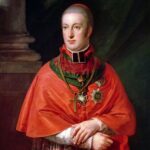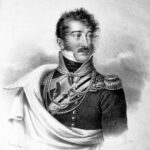We continue our ‘No man is an island’ series and in this new article we discover who Prince Lobkowitz was, what part he played in Viennese music history and in Beethoven’s life.
Joseph Franz von Lobkowitz (1772-1816) was an aristocrat of Bohemia, present day Czech Republic. He was a full time music enthusiast, spending fortunes on music, most notably for the support of Beethoven.
The duke was born with deformed hip, that made him to use a crutch all his life. Other sources tell that despite this he was so lively as a young boy that his father made him learn to play the violin in order to make him sit still. He also played cello.
Not only did he inherit nobility, a fortune in money and estates, he had enormous passion for music. He owned a palace in Vienna (Palais Lobkowitz), where he prepared a complete hall for concerts. He paid his own orchestra, solo and chorus singers, too. This appetite for quality music and the money he spent on it ultimately proved his financial disaster. As Count Razumovsky remarked: “This Prince was as kindhearted as a child and the most foolish music enthusiast. He played music from dusk to dawn and spent a fortune on musicians. Innumerable musicians gathered in his house, whom he treated regally.”
In his home in Vienna in Palais Lobkowitz he hosted the famous first – not public – concert of the Eroica symphony (even today the hall is called ‘Eroica Hall’) and the legendary piano duel between Beethoven and Daniel Steibelt.
When Beethoven arrived in Vienna in 1792 the two similar aged young men immediately became friends. Not only was he a friend to the composer, but a patron as well. In fact the three most important patrons in Beethoven’s life apart from Prince Lichnowsky, were Archduke Rudolph, Prince Kinsky and the Prince Lobkowitz. In 1808, when Beethoven was considering to accept the position of Kapellmeister in Westphalia offered him by Jerome Bonaparte (brother of Napoleon), the three main patrons (Lobkowitz, Lichnowsky and Kinsky) begged him to stay in Vienna and offered him a fix yearly allowance of 4 000 florins (a sum that provided Beethoven the complete freedom and financial security each year). It is important to state that he was sponsoring other musicians and musical events, as well. Among many others, he sponsored the premier of Haydn’s Creations in 1798.
|Related: The invitation of Jérôme Bonaparte to Beethoven
The prince was an active and important character of the Viennese art circles. He was a member in the Gesellschaft der Associierten, part of the management for the Court Theaters and last, but not least, head of the Vienna Opera for three years.
The rate on which he was burning his money for art, the war against Napoleon (in which he financed a body of riflemen), the depreciation of the Austrian currency finally pushed him to bankruptcy. In 1813 his estates and remaining fortunes were put under the control of trustees. The prince left Vienna and lived in Prague.
This financial trouble dried the income stream he offered to Beethoven, which fact made the composer angry at first. Later, even among his own modest possibilities (compared to previous living standards), Lobkowitz continued his support of Beethoven even beyond his death in 1816, until Beethoven’s own death (1827).
It is fair to say Beethoven liked the man and was grateful for his financial support. Probably only Archduke Rudolph has a more splendid list of dedications, but Lobkowitz has his name forever graved in stone by these compositions dedicated to him by the Great Master:
6 quartets (op. 18), the Eroica Symphony (op. 55), Triple concerto (op. 56), the Fifth and Sixth Symphonies (op. 67, op. 68), a Quartet (op. 74.) and the To the distant beloved song cycle (op. 98).
